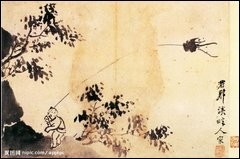Poetic quality comes from mist and imagination.
A child enjoys the cool air on the edge of a crop field on a summer night. An array of stars in the sky, the dark tree shadows in the distance, chorus by worms and frogs, with the comfort of breezes, the child will be triggered by all these things and will develop imaginations about the heaven, monsters, and all things which remain unknown.
However, when he learns that the stars are just burning fireballs, there is nothing behind trees, or when he thinks that he knows everything, then the poetic sentiment will quietly leave him.
It is because that he will no longer have such a passion and curiosity toward this world, the beautiful vision of the future and the distant and exotic imaginations.
Because he thinks that now he knows everything.


